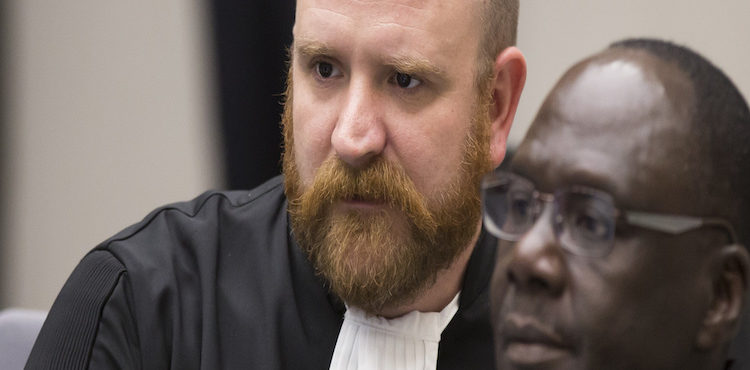Outside the International Criminal Court, temperatures hardly rise beyond 8.3 degree, but inside Court Room 1, where the trial of a warlord is in progress, it is an oven brimming with hostility.
Former Lord’s Resistance Army commander Dominic Ongwen, dressed in a blue, collared shirt, closely follows the proceedings at his war crimes and crimes against humanity trial through his headphones. Tension is in the air as a prosecution witness objects to questions from Ongwen’s lawyer. The lawyer, Ugandan opposition Member of Parliament Krispus Ayena Odongo, should not use the court as a platform for extracting secrets about the Ugandan army since he cannot obtain them from the government, the witness says.
Witness P-003, a member of the Uganda People’s Defence Force (UPDF), an interceptor during the LRA conflict. He speaks in the Acholi language, “I have lived in Acholi for almost 20 years. My wife is an Acholi,” he says in Acholi and waits for the court interpreters to turn his words into English for the judges and lawyers.
“I am an Intelligence Officer. I can’t reveal where intelligence officers are trained. You belong to the opposition in Uganda and you might be going against the Ugandan Government,” the witness retorts to a question from the lawyer during cross-examination.
“You have gone too far,” says the presiding judge. Bertram Schmitt. “I would strongly advise you to answer questions put to you by the Defence.”
Judge Bertram is sitting with Judges Peter Kovacs and Raul Pangalangan as Trial Chamber IX to hear the Ongwen case.Her advises the lawyer to take into context the previous witness testimony and subsequently cautions the witness against making impolite responses. “If anything will reveal your identity, we can go into a private session. The Court has enough experience to step in and not when you want it to step in. We as a court are following the rule of law and not politics. Mr (Krispus) Ayena and the rest of the Defence have a role as officers of the court and bound by their profession ethics and I don’t doubt that,” the judge admonishes.
“I was trained by Okello Adubang’o, who is now deceased,” the witness concedes. “Okello Adubang’o is a Luo born in Acholi, fairly aged and had knowledge of Acholi,” he says, explaining in response to a question that he joined the army at the age of 14 years because he loved the job.
“So you were a child soldier,” Ongwen’s lawyer poses, but Judge Schnitt sees the mischief and asks the lawyer to rephrase the question.
Odongo challenges the witness on his intelligence training by questioning him on whether he was taught that a good soldier ought not to take sides in partisan politics. “I am not a politician and politics does not figure in the training of the army,” the witness replied to the lawyer’s question.
Ongwen is charged with 70 war crimes and crimes against humanity charges. He was abducted at the age of 14 years and conscripted in the LRA as a child soldier. He is alleged to have led the 2003 and 2004 attacks on Pajule, Odek, Abok and Lukodi camps leading to deaths and the displacement of thousands of people.
“You have even written a book, we would like you to sell a copy to us,” says Odongo.
“I have come as Ugandan Representative at the ICC … the Ugandan Government, which referred this case to the ICC,” he says. Witness P-003 claims that the Ugandan Government gave him to the ICC so that they could obtain evidence from him. He spoke on how he sought permission in advance from his superiors and that his coming to the ICC was legal. Additionally, his superior was the one who instructed him to share the information on Ongwen’s trial with the ICC.
The cross examination took a twist of fate on the first day of the month, March 1, 2017.The trial continues with Witness P-003 still under cross-examination by the Defence.







